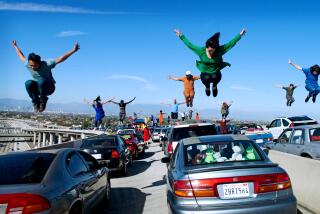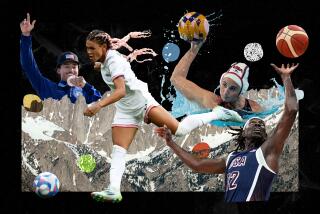They’re Going to Take It to a New Level: the Top of Kilimanjaro : Special Olympics: Diane Hall and Francisco Villasenor are used to meeting athletic challenges, so a 19,340-foot peak doesn’t look that tough.
- Share via
SAN DIEGO — Diane Hall makes it seem so simple.
Beginning next Thursday, Hall and another San Diego County resident, Francisco Villasenor, will be among 12 Special Olympics athletes from California who will scale formidable Mt. Kilimanjaro in Africa. She is the only woman in the group and, at 19, the youngest member.
Asked about the adventure, called the Kilimanjaro Confidence Climb, Hall said, “All I know is that we’re going to climb it, and I’m going to scream when we get to the top.”
It won’t be a picnic. At a peak of 19,340 feet, Kilimanjaro, located in Tanzania, is the highest mountain in the world that can be scaled without technical climbing equipment and techniques. The expedition will require six days of climbing, plus a day of rest at 12,300 feet to allow the climbers to acclimate themselves to the changes in altitude and temperature.
Still, Hall expects to have fun doing it, and so does Villasenor. They are a light-hearted, positive-thinking pair who look upon this as the most exciting time of their lives.
Hall, who was born in Santa Maria and lives in Santee, graduated from Granite Hills High School and is a freshman at Cuyamaca Community College, where she is enrolled in the school’s special education program for commercial art.
Villasenor, 22, was born in Tijuana, but his family moved to East San Diego “when I was a little kid.” He graduated from Crawford High School and works at a San Diego supermarket.
The two were chosen from a group of 44 who made a practice climb up 10,000-foot Mt. Jacinto near Idyllwild. Applications were available to all participants in California Special Olympics, except in cases where physical activity at high altitude would have been inadvisable for health reasons.
This will not be the first extraordinary venture sponsored by California Special Olympics Inc., which has headquarters in Santa Monica.
In August 1987, 25 Special Olympics athletes from California rode coast to coast on bicycles. The riders covered the 2,600 miles between Newport Beach and Jacksonville, Fla., in 30 days. Among them were two from San Diego, Mike Donais and Mike Nintman.
That event, like the climb up Kilimanjaro, was conceived, organized and led by Jim Benson, a board member of California Special Olympics. Benson rode with the cyclists and will scale the mountain with the climbers.
“California has one of the most active and ambitious programs in the United States,” said Joe Griner, program coordinator for San Diego County Special Olympics.
Climbing Kilimanjaro seems comparable on a difficulty scale to a cross-country bike ride. And it will be far more costly. The tab is estimated at $250,000, most of which has been raised through corporate contributions.
“I can’t wait to do it,” Hall said. “I wish we could go tomorrow.”
Villasenor doesn’t say as much as outgoing Hall but seems every bit as eager.
“I won’t be homesick at all,” he said. “I’m just going to enjoy it.”
Both Hall and Villasenor are remarkable all-around athletes. Hall competes in just about every sport the San Diego County Special Olympics program has to offer--basketball, volleyball, soccer, floor hockey, team handball and both Alpine and Nordic skiing. Villasenor’s Special Olympics sports are basketball, volleyball, soccer, floor hockey and softball. He also plays racquetball for recreation.
Villasenor has been with the program nearly four years and was one of 25 Special Olympians selected from throughout the world to attend the 1988 Winter Olympics in Calgary.
“I spent a month there,” he said. “Very nice.”
His favorite sport is floor hockey.
Hall’s favorite?
“That’s hard to say,” she said. “I just love sports. I do them the year around. It’s probably volleyball.”
Asked what sport is her best, Hall said, “Everything.”
Why does Hall want to climb a mountain?
“I love to travel,” she said. “Even if it’s Japan or something, I want to go there. I’ve only been to San Francisco and Victoria (Canada).
“I want to meet new people, go shopping and learn the language. Our tour director, Karen Wilson (of Newport Beach), sent us flash cards with words on them. All I’ve learned so far is duka, which means shopping or store; jambo, which means hello, and mizuri, which means fine or good. There are some words I’m still learning, and I’ve got to learn how to pronounce them.”
Hall’s weekly schedule shows she isn’t one to do much sitting around.
“I practice every night,” she said. “Monday and Wednesday I play floor hockey; Tuesday and Thursday I ski downhill; Friday is my goof-off day, and Saturday and Sunday I do homework, talk to friends or go places with my (Special Olympics) team.”
Of her team, which has six members, Hall said, “Half of them are jealous because I’m going, and half of them don’t want me to go because they’ll miss me.”
And her family and friends?
“My sister, Danielle, is also an athlete,” Hall said. “She’d like to go, too, but she doesn’t talk much about it. You know how sisters are. My dad is getting nervous, you can tell, but he’s excited for me.
“My friends all want letters and souvenirs, of course. My boyfriend is on my team, and he’s going to miss me, I know.”
Hall’s coach, Becky Nelson, a former athlete at Madison High School, was not surprised that Hall crashed the otherwise all-male lineup for this trip.
“I figured if any girl was going to make it, it would be Diane,” said Nelson, training director for San Diego County Special Olympics. “She’s a good athlete, very enthusiastic, and a real team motivator.
“A friend of mine suggested that we bring her into the program two years ago, and she has gotten better and better.”
Hall’s interest in mountain climbing evolved at a summer camp for the hearing impaired. She wears hearing aids in both ears, and is adept at lip-reading. After starting as a camper two years ago, she now is a camp counselor.
Griner noted that Hall, even though an outstanding competitor, approaches sports “with a great sense of fun.” This, he said, enables her to temper the “winning is everything” philosophy the Special Olympics seeks to avoid.
Villasenor is coached by Myra Snowdall, a special education assistant at Schweitzer School for handicapped students who does volunteer work for San Diego County Special Olympics.
“Francisco is a very motivated athlete, very easy to coach,” Snowdall said. “Like Diane, he is at the very high end of our program. Some people have to be helped getting dressed and going into the shower. He holds a full-time job.”
Villasenor has tremendous endurance, which he attributes to walking routes that take him over hilly terrain. He said he was “not tired at all” after completing the practice climb up Mt. Jacinto.
The traveling party left Los Angeles Jan. 31 and made intermediate stops in Frankfurt and Nairobi. Included are a doctor who is an experienced climber, a ski instructor who is a climber, an expert in wilderness survival, 16 coaches and a camera crew. They will sleep in tents and, as tour director Wilson put it, “It gets cold at 19,000 feet.”
The climbers will have to rise at 2 a.m on the sixth day to reach the top by dawn for what is said to be a spectacular sunrise. A safety factor is also involved, since frozen volcanic ash could make footing hazardous as the temperature rises.
By the time the climbers have returned to their starting point, they will have walked 72 miles and passed through six climatic zones. This is equivalent to experiencing the ever-changing weather conditions on a trip from the Equator to Alaska.
“It’s summer there now,” Hall said, “so we’re just bringing bathing suits and shorts and tops. Karen Wilson will give us thick clothes for when we get up on top.”
There will be time for sightseeing in Africa before and after the climb. The entourage will return Feb. 26.
Putting the whole project in perspective, Hall said, “Hopefully, this will happen again for other people like us.”
More to Read
Go beyond the scoreboard
Get the latest on L.A.'s teams in the daily Sports Report newsletter.
You may occasionally receive promotional content from the Los Angeles Times.






